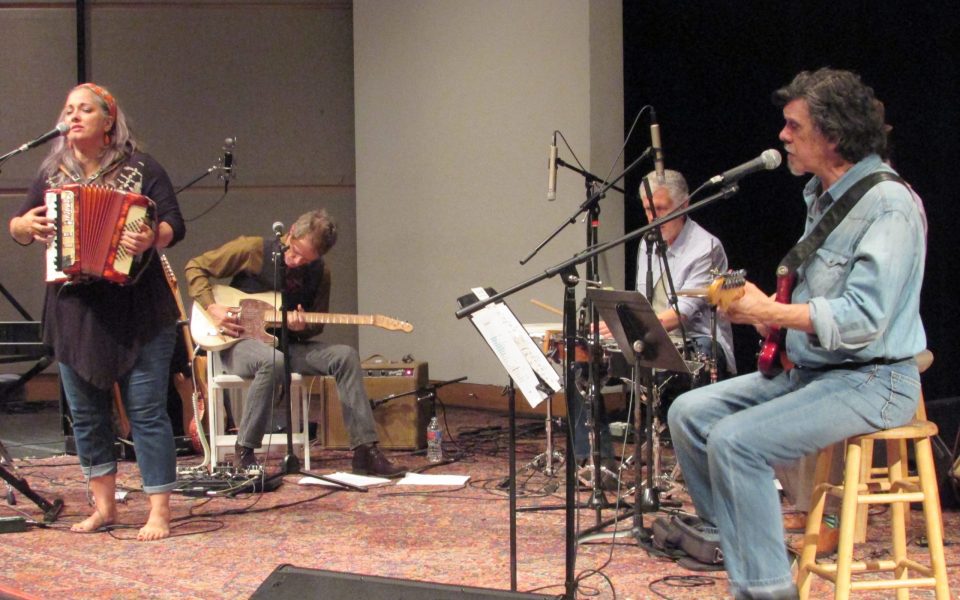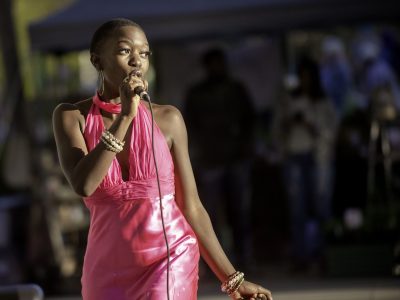by Jordan Green
Beth McKee
Beth McKee may not be local — she lives in central Florida and her music is rooted in New Orleans — but she spectacularly laid claim to Winston-Salem in late August with a commemoration of the 10th anniversary of Hurricane Katrina at the Southeastern Center for Contemporary Arts. To mark the occasion, McKee drafted friends Jeffrey Dean Foster and Tommy Malone to stage a soul-stopping jam session. The songwriter, pianist and accordion player’s new album, Sugarcane Revival is a personal travelogue that mixes traditional New Orleans funk with pop flair. She found able partners in Foster, who contributed an acoustic rendition of his song “Life Is Sweet” and a minor-key reworking of “When the Saints Go Marching In” to the party, and in Malone, who paid homage to Ry Cooder on “How Can a Poor Man Stand Such Times and Live?”
9th Wonder and Jamla Records
The inaugural Dash Pop Festival, created by an entrepreneurship class at Wake Forest University, hit a masterstroke when they brought in native son 9th Wonder, the erstwhile DJ in Little Brother and producer who’s worked with hip-hop greats Jay Z, Ludacris and Common. 9th delivered with a spectacular showcase of artists from his Jamla Records roster, including fellow Winston-Salem native Big Remo and rising star Rapsody, an emcee from Snow Hill. Rapsody had a big moment this year with her duet with Kendrick Lamar on “Complexion (A Zulu Love)” on his To Pimp a Butterfly album.
National Folk Festival
Mavis Staples owned the National Folk Festival, if anyone did, synthesizing the legacy of the civil rights movement with a gospel-soul lineage tracing from freedom songs to classic soul and her excellent contemporary work. But really the inaugural outing in September proved that the festival is about the tapestry of multiplicity in American folk culture, whether it was the joyous dance music of Garifuna guitarist Aurelio Martinez, the bristling honky tonk of Dale Watson or the irrepressible go-go party of DC’s Trouble Funk.
Rhiannon Giddens
Guilford County native Rhiannon Giddens was the local eminence of the National Folk Festival, participating in a night of protest music and co-hosting sets showcasing the black fiddle tradition and gospel music. This was a breakout year for Giddens, who stepped out with her first solo album, Tomorrow Is My Turn, following a decade of dues-paying with the African-American string-band group the Carolina Chocolate Drops. While attracting adulating fans in her hometown, Giddens also finds herself at the vanguard of the national folk scene, with long overdue recognition from publications like Rolling Stone and the New York Times this year.
Sinkane
Ahmed Gallab, a London-born musician of Sudanese heritage, is known for his electronic dance music, but during a late May appearance at the monthly Dance From Above party at the Crown in Greensboro, he defied expectations by playing a live set of simmering Afro-beat-inspired psychedelic rock. The shape-shifting musical polymath made no secret of his inspiration du jour, wearing a sleeveless Grateful Dead “skull and lightning” T-shirt and leading the band through a jam of the Dead’s “Going Down the Road (Feeling Bad).”
Grateful Dead
Speaking of the Dead, the band’s 50-year anniversary farewell concerts at Soldier Field in Chicago left a distinct impression on the Triad, with venues like the Blind Tiger in Greensboro and Ziggy’s in Winston-Salem simulcasting the three concerts over the Fourth of July weekend. The concerts provided a fascinating overview of the band’s rich history, with Phish’s Trey Anastasio filling in for the late Jerry Garcia with crystalline lead guitar playing and note-perfect vocals. But the venture was not quite ready to be laid to rest. The Dead (minus original bass player Phil Lesh) went back on the road, with a new lineup that included John Mayer and Oteil Burbridge, making a stop at the Greensboro Coliseum in November.
Mipso
Mipso is proof that the Triad incubates talent even if we don’t have the infrastructure to properly nurture it. Three out of four members of Mipso, the traditionals-plus acoustic string band, grew up in Greensboro and High Point, but they met and learned their craft as students at UNC-Chapel Hill. They packed the Garage in Winston-Salem in August, typical in a strenuous touring schedule helping the group build a national following. Their new album, Old Time Reverie, reaches into a deeper spiritual core than its more glossy predecessor Dark Holler Pop. The band’s roadwork was capped with a spot performing during the Macy’s Thanksgiving Day Parade in New York City.
Jadon Success
Jadon Success created an internet sensation with his “Welcome to High Point” YouTube videos, released in 2013 and 2014, which bolstered Third City pride by juxtaposing public housing communities like Carson Stout and Juanita Hills with landmark institutions like the furniture market and the city’s namesake university. In July he spoke to the NAACP Youth Conference, and the next month he told Triad City Beat about his efforts to set a positive example and promote unity during a tour of the city. In 2015, Jadon Success continued a prolific run with “Ms. Carolina,” a collaboration with Ricco Barrino, and “What a Feeling,” a song that celebrates less wholesome pursuits.
Black Violin
Just as technological advances in acoustics have allowed the Avett Brothers to fill arenas with banjo music, so too can Kevin Sylvester and Wilner Baptiste seamlessly merge classical music and hip hop on violin and viola respectively. Playing before a capacity crowd at High Point Theatre in January, they closed a loop, reclaiming the violin as an instrument of American popular music in the tradition of Stuff Smith, Michael White and Papa John Creach.
Alice Gerrard
Follow the Music, the 2014 album produced by Hiss Golden Messenger’s Mike Taylor, represents a kind of credo for Alice Gerrard, a legendary folksong collector and singer, who is now 81 years old. She was nominated for a Grammy for Best Folk Album in 2015, but fell short to Old Crow Medicine Show. Her stature was reinforced during a performance with Laurelyn Dossett, Scott Manring and others at UNCG in January that bloomed with performances of the title track from her recent album and “Mining Camp Blues,” a song originally recorded by Trixie Smith & Her Downhome Syncopaters in 1925.
Join the First Amendment Society, a membership that goes directly to funding TCB‘s newsroom.
We believe that reporting can save the world.
The TCB First Amendment Society recognizes the vital role of a free, unfettered press with a bundling of local experiences designed to build community, and unique engagements with our newsroom that will help you understand, and shape, local journalism’s critical role in uplifting the people in our cities.
All revenue goes directly into the newsroom as reporters’ salaries and freelance commissions.





Leave a Reply